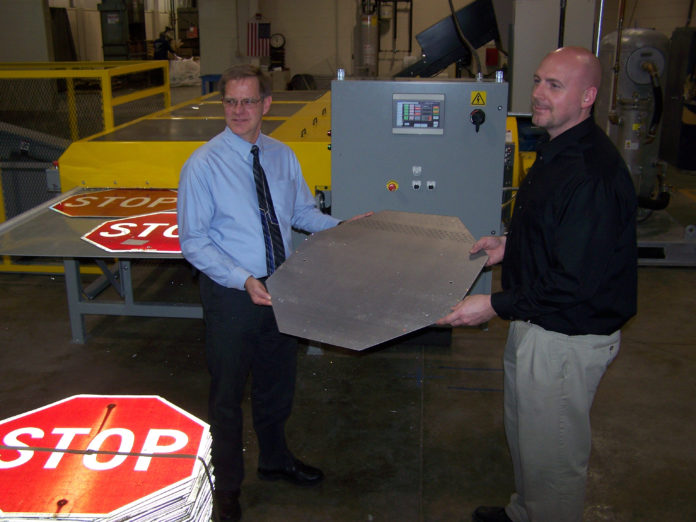
Lott Industries has developed a hydro-stripping process to help the City of Toledo save on the cost of traffic signs by stripping existing metal signs to the bare aluminum so they can be reused.
Lott and the City of Toledo will celebrate this new service during ribbon-cutting ceremonies April 15 at Lott’s facilities on Hill Avenue from 9 a.m. until noon. Toledo Mayor D. Michael Collins and officials from the City, Lucas County and Lott will participate in the ribbon-cutting at 10 a.m.
Revised federal guidelines require that traffic control signs be more reflective which creates a situation where it is not easy to reuse signs, according to Dennis Lechlak, commissioner of the Division of Transportation for the City of Toledo.
The transportation division discovered a way to meet federal guidelines regarding traffic signs and to refurbish the used materials in the most cost-effective, environmentally way possible, Lechlak said.
The City’s Chief Planning Engineer Gary Stookey, and David Harris, superintendent of the Sign Shop, began researching options for stripping signs of sheeting material and reusing the clean aluminum blanks to produce new signs. They discovered hydro-stripping, a relatively new process that removes the reflective material from the signs using ultra-high pressure water-jet technology.
The potential cost savings were nullified by the cost of shipping the signs to those who provided this service, so they continued to search for a more cost-effective solution, Lechlak said.
Lechlak contacted Tim Menke, sales manager at Lott, to see if they might be interested in finding a way to provide the service.
“The City of Toledo came to us with a potential opportunity. We investigated it to determine its feasibility,” said Dan Clemens, chief operations officer at Lott. “We visited a company with a similar process about possibly buying the machine that performs it. It just wasn’t a good fit for the services we wanted to provide.”
Clemens developed the concept and specifications for a hydro-stripping operation that would meet their needs and be cost-effective. He has a background in automation and robotics in manufacturing with several firms in Northwest Ohio before joining Lott.
Lott hired two Northwest Ohio companies to help produce the equipment. Koester Corporation of Napoleon developed the detail design and manufactured the machine, while F.S. Solutions of Toledo provided the pump and high-pressure equipment for it, according the Clemens.
“We teamed up to provide a customized solution utilizing local resources. It was a perfect fit for the City of Toledo, Lott, and the services we provide,” Clemens said.
“Lott analyzed the existing process and completely re-engineered it. They designed and built a machine to hydro-strip our used traffic signs that will be reused in making new signs,” Lechlak said.
He explained that the City replaces about 13,000 signs annually with the aluminum sheets for the signs costing about $2.15 per square foot. Lechlak estimates the City could save 25 percent on the cost of replacing those signs, reducing the cost of a new stop sign from $6.50 to $4 using the process at Lott.
Assisted by an economic development loan from the City of Toledo Department of Development, Lott industries purchased and installed the hydro-stripping operation at its facility on Hill Avenue. With the close proximity of that facility to the Division of Transportation on Westwood, there will be no shipping charges associated with the transport of signs for the process, Clemens said.
The hydro-stripping equipment is installed and operational at Lott’s facility where it has been tested. They expect to begin transforming used traffic signs into blank aluminum sheets for refurbishing almost immediately, Clemens said.
Legislation for contract services is currently being drafted for the processing services between the City of Toledo and Lott Industries. Once City Council approves that legislation, Lott could begin processing signs for the City, according to Lisa Ward, public information officer for the City of Toledo.
“It’s all about the partnership with Lucas County and the City of Toledo while doing it right environmentally and saving money,” Clemens said.
The process will provide training and work opportunities for some of Lott’s existing employees. He said they already have people lining up to learn the new operation.
Clemens reported that they are looking for additional potential users of the hydro-stripping process. They already have talked to people at the Ohio Department of Transportation who were interested in knowing more about the process and its costs.
Ohio Governor John Kasich supported the use of the local hydro-stripping process at Lott by ODOT District 2 during his visit to Toledo April 9, according to Ward.
Lott employs about 500 persons with developmental disabilities. About 250 people work at both the Hill Avenue facility and the plant on Holland Road in Maumee.
Lott provides a variety of work and services for numerous local, national and global clients. It qualifies for ISO 9000 and ISO 1400 quality standards for the automotive industry, according to Roger Bresnahan, a retired engineer and member of the County Board of Developmental Disabilities.
Bresnahan is one of two members on the seven-member board who are appointed by a probate judge, while the other five members are appointed by the Board of Lucas County Commissioners.
Lott Industries is a non-profit corporation affiliated with the Lucas County Board of Developmental Disabilities that provides employment opportunities and training for individuals with developmental disabilities.






















